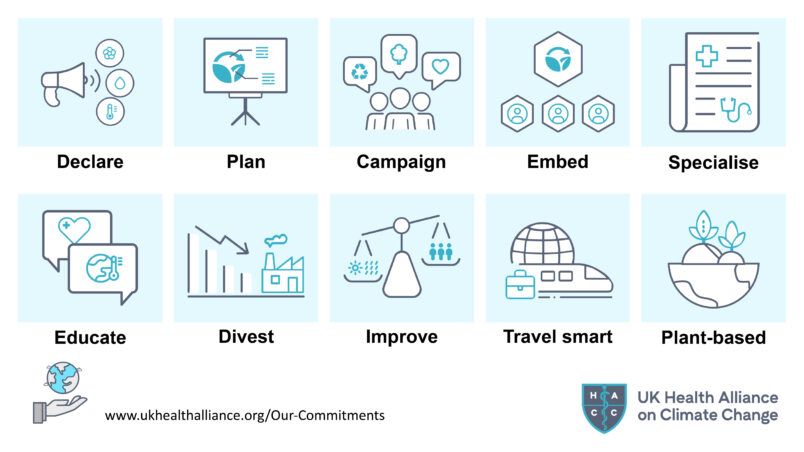The members of the Alliance include royal colleges, faculties, associations, societies, academies, and journals, with variations in the size and type of work that they do; and our members’ members are over a million, much of the NHS workforce. Collectively, we recognise the benefits of an overarching set of principles but also recognise that individual organisations will adapt the commitments to suit their different circumstances.
The commitments provide a platform to enable organisations to act, collaborate, share learning and support each other to achieve their individual aims.
A webpage outlining the commitments with links to further information, guidance and resources on how to achieve each one has been developed to support organisations to deliver the actions.

Richard Smith, Chair of UKHACC said: “If we are to successfully counter the climate crisis everything must change, including our members. Health professionals are leaders in responding to the climate crisis, and leaders must walk the talk. That’s why these commitments are important.”
Dr Ranee Thakar, President of the Royal College of Obstetricians and Gynaecologists, said: “Recognising and limiting our own contributions to the climate crisis, supporting our membership, and advocating for change are all integral to our work in supporting women’s health and reproductive care in the UK and across the world. This is why, as President, I have committed to ensuring action on climate change is a priority for the RCOG.
“We are delighted that UKHACC is supporting its members to make positive changes to mitigate and adapt to climate change. We have made significant changes already however we look forward to collaborating with others on these important commitments in the future.”
Dr Latifa Patel, BMA representative body chair said: “The BMA is delighted to be working with UKHACC to highlight the importance of working sustainably. At the BMA we are committed to reducing our environmental impact and are constantly re-evaluating our practices to reduce our carbon footprint further.”
Dr Adrian James, President of the Royal College of Psychiatrists, said: “Climate change, pollution and biodiversity loss have created a mental health crisis that will disproportionately impact vulnerable groups, including children and people with pre-existing mental illness.
“The climate crisis has devastated communities across the globe in recent years, and we know the health sector has a key role to play in mitigating these threats. The Royal College of Psychiatrists is committed to tackling the growing climate emergency and will work to promote sustainable mental health services.
“The College has pledged to achieve Carbon Net Zero by 2040 as part of an ambitious plan for sustainability. We have also already divested from all fossil fuels and re-invested in a portfolio that promotes the United Nations Sustainable Development Goals.”
